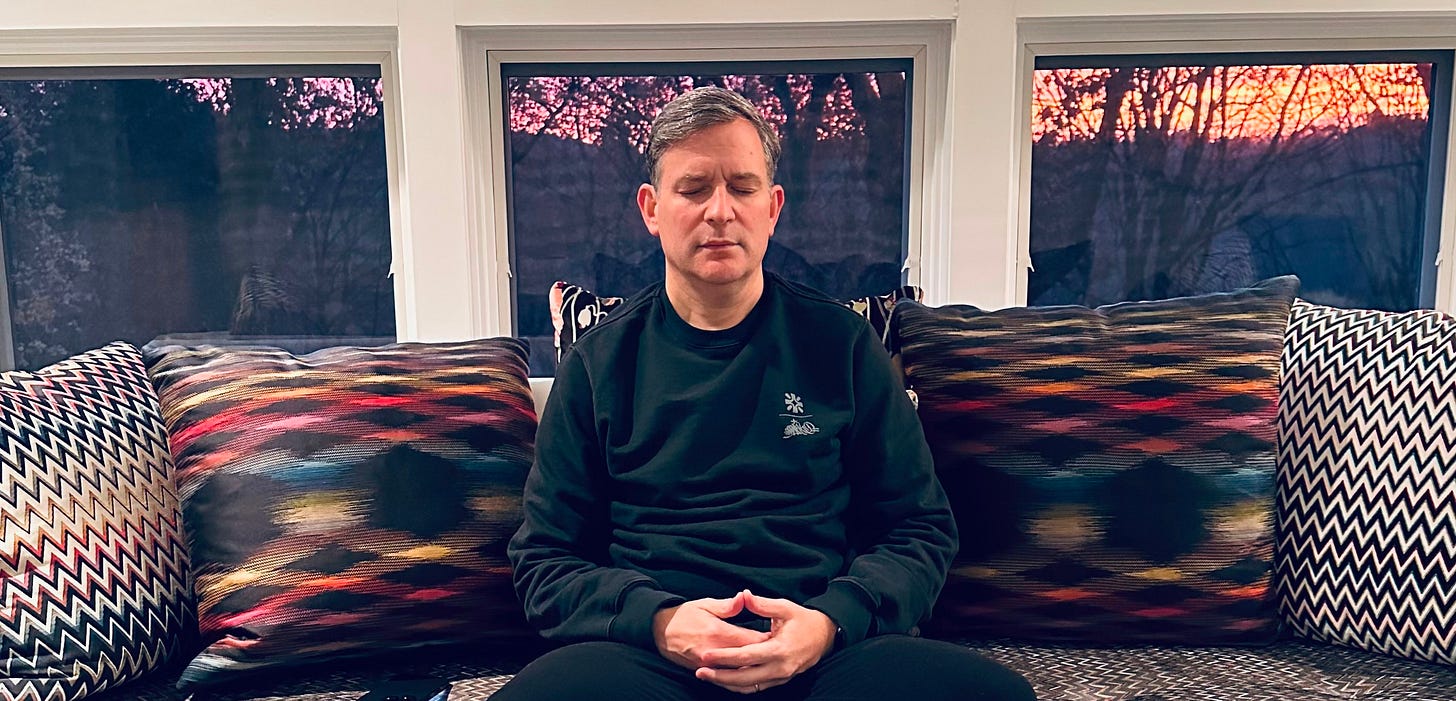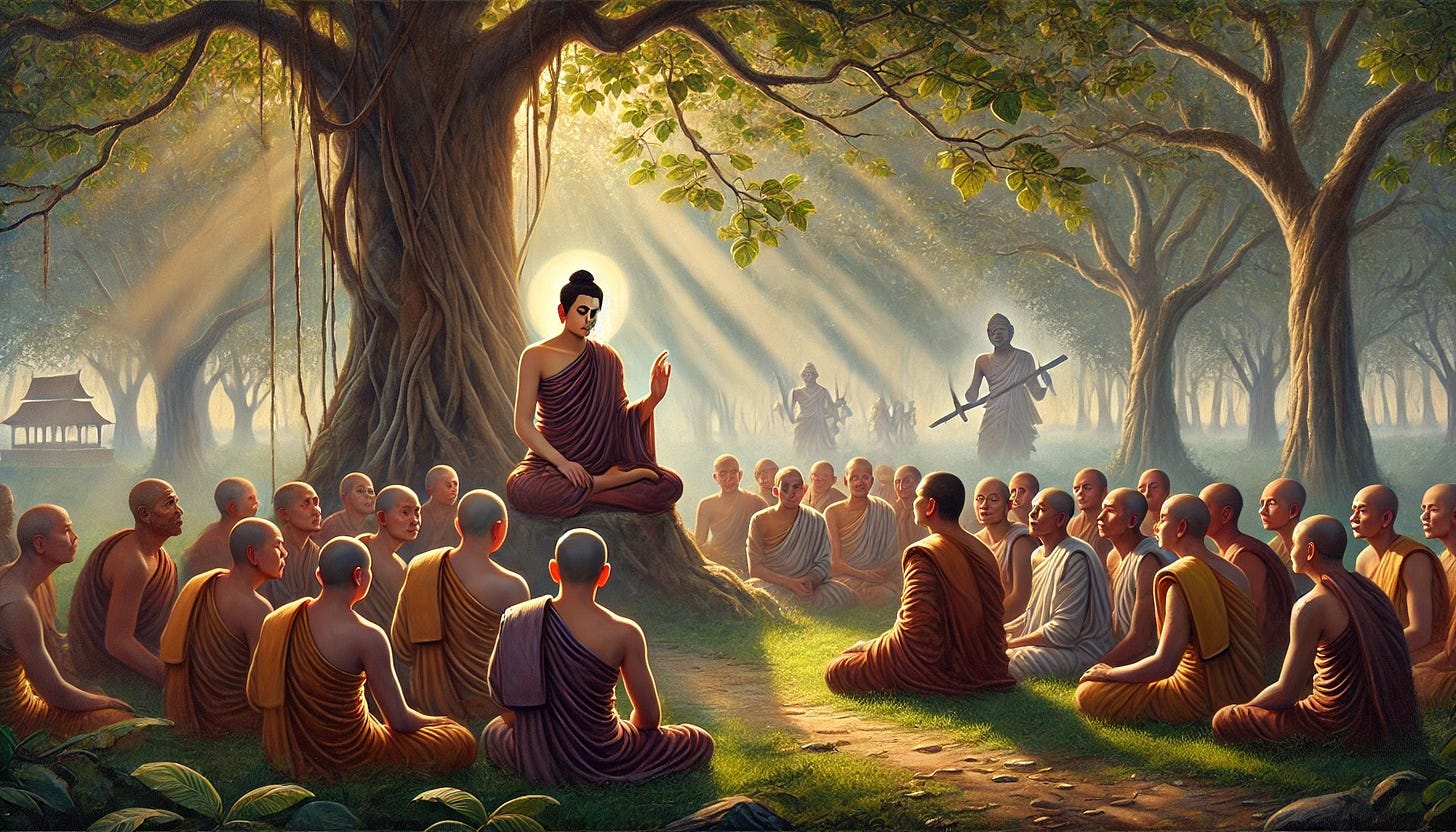How would the Buddha handle Trump’s inauguration?
6 strategies for navigating tense political times
I’m experimenting with a longer Sunday missive. Hit me up in the comments.
The Buddha might seem like the ultimate avatar of calm—the serene, limber figure who has become a fixture in backyards, restaurants, and places where you can get a massage.
However, the man known to most of us as a lawn ornament was actually deeply engaged with the world.
If the ancient Buddhist texts are to be believed, he spent the 45 years after his enlightenment wandering through the Ganges River basin, teaching farmers, kings, and everyone in between. During that time, he also debated with critics, fundraised with wealthy merchants, and intervened to stop wars.
So what would he advise those of us who have strong emotions about the inauguration, whatever side we might be on?
Below are six strategies drawn from the Buddhist texts and also from my conversations with contemporary dharma teachers. (Read all the way to the end for info about some live meditation + Q&A sessions that I will be doing, starting later today. They’re designed to help you get this wisdom into your molecules.)
Calm your mind
Easier said than done, obviously.
How to become calmer (i.e. boost your equanimity/okayness/unshakeability) in a turbulent world?
The Buddha consistently advised that the express lane to equanimity was to contemplate impermanence. Political situations come and go. In fact, everything comes and goes. Nothing and no one is exempt from the law of ceaseless change.
This passage from the texts puts it beautifully:
“This is how to contemplate our conditioned existence in this fleeting world: Like a tiny drop of dew, or a bubble floating in a stream; like a flash of lightning in a summer cloud, or a flickering lamp, an illusion, a phantom, or a dream.”
One way to hone your attunement to change is to engage in a little bit of mindfulness meditation on a daily-ish basis. When you sit quietly and feel your breath, you begin to notice how everything changes all the time. Sensations, thoughts, emotions—they’re all part of a passing show. The more this insight gets embedded, the more it provides a sense of equanimity-inducing perspective.
Another way in which meditation can boost your equanimity: by allowing you to sit with uncomfortable emotions and physical sensations—to let them come and go, and then to make a saner decision on the other side. As the Buddhist nun Pema Chödrön often says, “Feel the feelings—drop the story.”
Along those lines, I recently heard an excellent piece of advice from Sharon Salzberg, the legendary meditation teacher. She was asked by a left-leaning student how to endure another four years of Donald Trump. Sharon’s answer: if you think of it as a four year ordeal, that makes the whole thing too hard. The truth is, you really only have to endure one moment at a time.
Cultivate compassion—even for your “enemies”
In an era of heightened political polarization, where each side increasingly views the other as a threat to the republic, compassion may seem unappetizing—or impossible.
But the Buddha said that developing a sense of empathy, caring, and concern was non-negotiable—even for your “enemies.” Further, he argued that doing so was very much in your self-interest.
I’ll make the self-interested case in a moment, but first, a story to illustrate how hardcore the Buddha was on this issue.
In the texts, there’s a passage describing how the Buddha was called in to resolve a bitter dispute among a group of monks at a place called Kosambi. The monks were arguing over a minor doctrinal issue, and the Buddha told them that their behavior was unbecoming. He offered the parable of the saw:
“Even if bandits were to sever you limb by limb with a saw, you must not harbor ill will. Whoever harbors ill will is not a follower of my teaching.”
OK, I recognize this is a bit of a stretch. I’ve been practicing meditation for 15 years, and if someone came at me with a saw, I don’t think I could muster compassion for them—at least not in the actual moment when they were having a go at one of my limbs.
Truly, however, it is neither unreasonable nor impossible to have compassion for people with whom you disagree politically.
To be clear, compassion doesn’t mean you should invite difficult people over for dinner or become a doormat. It means you recognize that everybody has arrived at their views because of their own conditioning. And if you were in their shoes, you might believe, say, and do exactly the same stuff.
One little phrase that helps me remember to do this comes from my friend and meditation teacher, Joseph Goldstein: “Love no matter what.”
Again, to be clear, you can have love or compassion for people with whom you disagree without acquiescing to their beliefs. It’s possible to take a stand without being motivated by rage. In fact, in my experience, compassion—for your “enemies,” for your allies, for yourself—is a much cleaner-burning fuel.
Do you see the self-interest here? Compassion not only makes you more effective but also happier. Ask yourself: How do I want to do these next four years? Contracted in rage? Or steely but calm?
Don’t be attached to your opinions
We live in a time where social media companies have encouraged us to snuggle into our own bespoke info-silos—echo chambers where so-called “conflict entrepreneurs” are rewarded by the algorithms for stoking our prejudices and reinforcing our priors.
The Buddha repeatedly warned against the dangers of dogmatism. Here’s one of my favorite lines from the texts:
“Those who cling to perceptions and views wander the world annoying people.”
Research also suggests that open-mindedness improves innovation and creativity—and can even increase focus and working memory.
So, how can you open your mind?
Three suggestions:
First, try to be mindful of those times when you’re drifting toward dogmatism. If you can catch yourself clinging to your views, try dropping this Joseph-ism into your mind: “Certainty is not an indicator of truth.”
Second, broaden your media diet. Try consuming content from people with whom you disagree. There’s some evidence this can make you less polarized and more open-minded.
Third, if you are up for it, having careful, face-to-face conversations with people with whom you disagree can also be effective. Researchers refer to this as the “contact hypothesis,” whereby people from differing groups reduce bias and increase empathy by getting to know one another.
Which brings me to…
Practice “right speech”
If you’re going to talk to people on the other side of the political divide, it’s helpful to have a few tools.
The Buddha expended a lot of calories trying to teach his followers how to engage in effective communication, which he called “right speech.”
This is a rich topic, but here are three rules of thumb, straight out of the texts:
Say that which is true
Say that which is useful
Say it at the right time
These rules don’t bar you from speaking your mind (although the Buddha did say that silence is sometimes the wisest option). But next time you get ready to speak—about politics or anything, really—ask yourself: Is it true? Is it useful? Is it the right time?
Actually, there’s one other little Buddhist rule of thumb that I find helpful before I run my mouth in conversation or pop off on social media: Is what I’m about to say going to bring people together or drive them apart?
As always with the Buddha’s ethical injunctions, it’s not just about doing the right thing vis-a-vis other people; it’s also about self-interest. If you follow these guidelines, you may find yourself feeling less regret and more calm.
Get out of your head by giving back
Before he taught people meditation as a way to tame the mind, the Buddha often taught generosity.
Giving back can be a great way to manage your emotions before, during, and after the inauguration.
There are lots of options: You can get involved politically, volunteer at an animal shelter, or simply increase your helpfulness quotient with your friends, family, and coworkers.
As many of my meditation teachers like to say, “Action absorbs anxiety.”
Here’s how the Buddha put it while praising a wealthy merchant who used his resources to support the community:
“The wise person does not hoard but gives away, and through generosity, they achieve happiness and peace.”
In whatever way you choose to give back, the Buddha would want you to keep this caveat in mind…
Don’t be attached to results
Don’t be fooled by the Buddha’s emphasis on generosity, compassion, and equanimity. The dharma is not about avoidance, quietism, or calamitous altruism. Again, the Buddha was neither passive nor resigned; he would absolutely support your taking action on issues you care about.
But he would also have you bear in mind that we live in a world characterized by impermanence and entropy. So when it comes to navigating the inauguration and whatever comes after it, you are best served by taking whatever action you feel is most effective (volunteering, etc.), but without getting attached to any specific results. As the political strategist David Axelrod once said, “All we can do is everything we can do.”
Here’s how the Buddha put it:
“Just as the farmer does his work and depends on the rain, the wise one does their work and lets go of the fruits. Whether the rain comes or not, they remain content, knowing they have done their part.”
In sum:
As challenging as this moment in history can be for many of us, I want to reframe it for you as a workout, a dojo—an opportunity to practice skills that will help you in all aspects of your life.
Every moment, especially the unpleasant ones, can be a chance to wake up. I’ll close with another Joseph-ism: “Don’t waste your suffering.”
***
Finally, a programming note: I’ll be doing a series of free, live, guided meditation sessions—starting today and running through Wednesday, January 22nd. Each session will be at 3:00 PM Eastern. All you have to do is download the Substack app.
Today and tomorrow, I’ll be leading the sessions on my own. I’ll guide a brief meditation and then take your questions. On Tuesday and Wednesday, I’ll have special guests. Tuesday, it’s political analyst and CNN commentator Van Jones. Wednesday, it’s bestselling author and “America’s Government teacher,” Sharon McMahon.
Paid subscribers can submit questions ahead of time in my chat.
Join us. The world is insane—but you don’t have to be.








Love this, Dan. Thank you for the longer format today. Always appreciate that you have mined the expanses and offered us the gold nuggets! Appreciate you so much.
Love the longer Sunday form, Dan. Much wisdom in today’s edition thanks to you and the Buddha. Onward with kind, curious awareness! 🙏